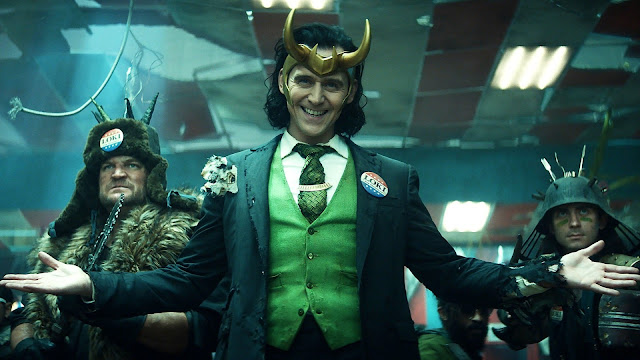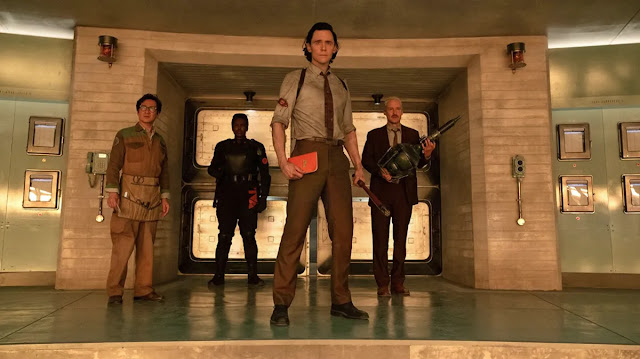Time travel is impossible in real life, but it’s also pretty difficult to pull off in fiction, where a nifty plot device can too easily devolve into a tangled nest of convoluted exposition. The first season of “Loki” avoided this problem, making the Disney+ show a bright spot in a somewhat stagnant era of the Marvel Cinematic Universe.
In following a “variant” of the Norse trickster god into the depths of the Time Variance Authority, or TVA, the series paired impeccable production design with a simple emotional narrative — especially once our primary Loki (Tom Hiddleston) met his match in his female counterpart Sylvie (Sophia Di Martino), a relationship that opened questions of identity, free will and self-determination. Tracking the potential branches of the so-called Sacred Timeline could make your head spin. Like a Zen koan, “What makes a Loki a Loki?” is grounding and easy to grasp.
In the final moments of its first season, “Loki” revealed it would become the first Marvel Studios show for Disney+ to have a second season. This news came as a relief, given its cliffhanger ending; after Loki and Sylvie traveled to the end of time, Sylvie killed He Who Remains (Jonthan Majors), the founder of the TVA and the primary obstacle keeping the Sacred Timeline from becoming a full-fledged multiverse.
When Loki, having tried to stop her, returned alone to the TVA, he found an office transformed, with statues of He Who Remains looming everywhere and employees like Agent Mobius (Owen Wilson) having no memory of their quarry-turned-collaborator.
Two years later, “Loki” is back, and not a moment too soon. Though the show started the MCU’s Multiverse Saga on a high note, the franchise’s latest phase has since run into trouble onscreen and off. “Ant-Man and the Wasp: Quantumania” was a critical and commercial disappointment that failed to build on the goodwill generated by “Loki,” despite using some of the same concepts and characters.
Meanwhile, Majors is facing trial for charges of assault and aggravated harassment against his former girlfriend, throwing Marvel’s plan to make his character the next Thanos-style archvillain into question. (Not that blockbuster business planning should be anyone’s main concern when it comes to allegations of domestic violence, but with this much money on the line, it is a concern to some.)
Such circumstances place a great deal of pressure and scrutiny on “Loki” Season 2, which has also seen some personnel shuffles behind the scenes. (Eric Martin takes over head writing duties from creator Michael Waldron, while sole director Kate Herron has passed the baton to a larger group led by collaborators Justin Benson and Aaron Morehead.) But while “Loki” remains a cut above other MCU shows, second only to “WandaVision,” Season 2 succumbs to the same traps the original story so cleverly avoided.
While the first episodes of “Loki” used its namesake as an audience surrogate, gradually laying out the purpose, customs and bylaws of the TVA, Season 2 begins in media res. Right away, Loki is tasked with finding Sylvie, figuring out why he’s hopscotching through time and navigating the chaos of a TVA workforce that’s just discovered all memory-wiped variants from “severed” — or less euphemistically, eliminated — timelines. It’s a lot, perhaps too much, for both Loki and the viewer to process, especially since the story feels increasingly unmoored from Loki’s own journey of (literal) self-discovery.
Instead, the season introduces new MacGuffins like the Temporal Loom and characters like Ourobouros (Ke Huy Quan), a kind of cosmic IT guy tasked with keeping TVA equipment in shape. There’s frantic motion and momentum, but not as much of a sense of who wants what, and why, when it comes to complicated questions of personal autonomy versus the collective good.
In fact, one gets the sense that “Loki” maintains the breakneck speed precisely so it doesn’t have to slow down and root the action in its characters’ wants and needs. Online explainers will surely lay out the logistics in exhaustive detail, but they can’t create the sense of emotional urgency the season palpably lacks.
At least there are the performances, delivered by an ensemble within the MCU’s mega-ensemble that remains one of its best. On an extended victory lap after his Oscar win for “Everything Everywhere All at Once,” Quan brings an antic energy to Ourobouros, or OB, that complements the wacky hijinks he’s asked to facilitate.
Rafael Casal is less well-served as a TVA employee who’s barely introduced before becoming a fugitive we’re told is crucial to the plot, though through no fault of his own. And when taken on its own terms, Majors’ work as He Who Remains in his various incarnations is an idiosyncratic and strangely magnetic break from Marvel house style — though whether it should be considered separately from his off-set behavior is another question entirely.
The playful, inventive visuals also continue to give “Loki” an added edge, from the crammed gadgetry of OB’s workshop to a quick detour in 1970s London to an entire episode set in 19th century Chicago. But where everything from the set design of the TVA to its complicated cosmology once felt in service to Loki’s burgeoning ability to feel camaraderie and love, the hierarchy now feels reversed.
Even though, via spoiler-y means, Loki and Mobius do get to resume their buddy routine, there’s less space for either their friendship or Loki’s bond with Sylvie when everyone is racing around for unclear reasons. “Loki” is still a good time, but despite the renewal, it may not have been built for a long one.










0 Comments